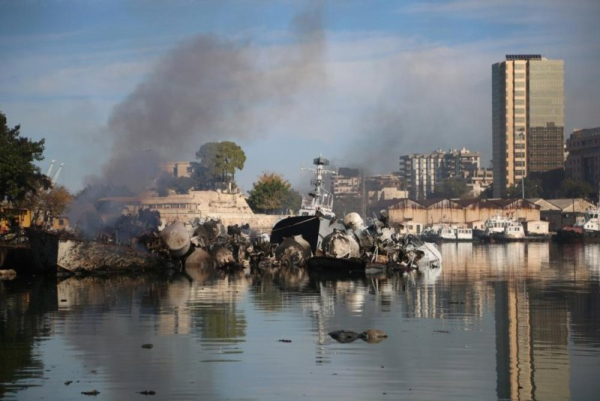
Damaged vessels sit Tuesday at the Latakia port in Syria after a reported Israeli airstrike targeting the harbor. Several airstrikes reportedly carried out by the Israelis targeted weapons facilities and military airports after the ousting of Syrian President Bashar al-Assad on Sunday. Photo by Bilal Al Hammoud/EPA-EFE
Syrian rebels, who toppled President Bashar Assad over the weekend, named Mohamed al-Bashir as caretaker prime minister of the transitional government Tuesday as Damascus gradually returns to normal life.
Al-Bashir, a little-known figure who held the position of minister of development and humanitarian affairs in the Hayat Tahrir al-Sham-formed Salvation Government, announced that he has been tasked to lead the interim authority until March 1. Advertisement
He said a team from the Salvation government and the government of the ousted regime held a cabinet meeting, which also was attended by the prime minister under ousted Assad Mohammad al Jalali, “to transfer the files and institutions” to the caretaker government.
Reports indicated that Al-Bashir’s appointment came during a meeting on Monday that gathered the leader of HTS, Ahmad Sharaa, better known as Mohammed al-Joulani, al-Jalali, and al-Bashir. The meeting focused on discussing arrangements for the transfer of power and to prevent avoid Syria from descending into chaos. Advertisement
Al Jazeera TV quoted sources in the new political administration as saying that security services will be dissolved, anti-terrorism laws abolished and the state of the Army reviewed.
Maintaining security, providing services to the citizens and securing a smooth transition were priorities of the interim government to be formed, according to the sources who emphasized that the caretaker cabinet will pave the way for a permanent government.
On Monday, the Syrian People’s Assembly, or parliament, said it supports the will of the people to build a “new Syria.” Speaker Hamouda Youssef Sabbagh told Sky News Arabia that the Assembly is “ready to provide any assistance to achieve a smooth transition.”
The toppling of Assad opened the door for absorbing those who defected from his army and who fled compulsory service.
Maj. Muhammad Ghanem in the Syrian Salvation Government said some 1,000 defectors came back, while “while there are thousands of defectors waiting to settle their status.”
Shortly after controlling Damascus on Sunday, Al-Joulani called on his fighters not to harm any of the army recruits and granted amnesty to “those whose hands are not stained with the blood of the Syrian people.”
He promised, however, that security and army officers who were involved in torturing and killing thousands of Syrians under Assad’s rule will receive “just punishment,” and a list including the names of the most senior people involved in war crimes will be released. Advertisement
Meanwhile, life began to slowly return to normal in Damascus, with heavy traffic, shops and banks reopening and a notable decrease in the number of armed men on the streets.
Many government institutions and departments resumed work after former Prime Minister al Jalali called on the estimated 400,000 public employees to provide services to citizens. Some were still fearful and asked for assurances.
Workers were seen cleaning the streets and fixing damage in some parts of the city. Syria’s Central Bank is to officially resume operations Wednesday.
Some citizens are still celebrating, with young men seen mounting an army tank and raising victory signs.
The chaos that followed the rebels’ capture of the capital seems to be contained after a night curfew was imposed by the rebels.
In the first hours after Assad’s fall and escape, citizens and gunmen stormed his palaces, taking whatever they could, while others were seen carrying bags of cash from the Central Bank. Some shops also were looted. Celebratory gunfire killed some 28 people.
According to news reports, rebel fighters were ordered to withdraw from the cities on Tuesday and are to be replaced by HTS-affiliated police and internal security forces in civilian areas.
In neighboring Lebanon, which has seen an influx of Syrian regime supporters across its eastern Masnaa border crossing after Assad fled to Russia, a newspaper report raised alarm by claiming that senior Syrian officials and their relatives sought refuge in the capital of Beirut and its Hezbollah-controlled southern suburbs. Advertisement
Among them was reportedly Assad’s senior adviser and top intelligence officer, Ali Mamlouk, who is wanted in Lebanon on charges of planning the assassination of Lebanese political and religious leaders, as well as the bombing of two mosques in the northern city of Tripoli in 2013. He also is wanted in France for war crimes and crimes against humanity.
Lebanon’s interior minister, Bassam Mawlawi, denied that any security official from Assad’s ousted regime entered Lebanon, which has imposed strict measures at border crossing points.
Mawlawi said anyone wanted by the Lebanese judiciary will be arrested.
Two main political parties, the Druze Progressive Socialist Party and the Christian Phalange Party, cautioned against hosting fleeing Syrian officials and called for arresting them.
The Progressive Socialist Party warned of turning Lebanon into “a safe haven for those responsible for many crimes against Lebanese and Syrians,” calling on the security and judicial institutions for action “so that Lebanon does not bear legal and political repercussions.”
The Phalange Party called on the security services to investigate and arrest Syrian criminals if they proved to be in Lebanon.
Malawi said that nine Lebanese, among a few hundred who were imprisoned in Syria and whose fate was unknown, have returned to the country after Syrian rebels stormed Assad’s run prisons and freed thousands of prisoners, the great majority of whom spent up to 40 years in jail without trial. Advertisement
Syria under Assad has repeatedly denied the presence of any Lebanese political prisoners in its jails.